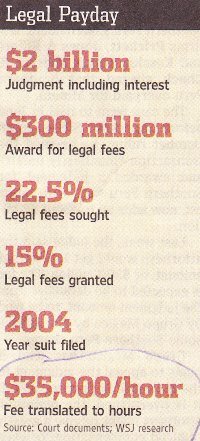December 30, 2011, - 4:37 pm
Outrageous Payout of the Year: Law Firms Awarded $35,000 Per HOUR in Suit
This is one of those stories that provides yet another reason people hate lawyers. As a practicing lawyer myself, I know that sometimes law firms and lawyers take risks and do all the work in the case on the gamble that, if they win the case or it settles, they will get a contingency fee (usually a third of whatever the client is awarded). It’s an investment of sorts. But this case is ridiculous, with law firms involved earning $35,000 per hour that they worked on the case. And, in this case, it was up to the court to award proper legal fees. And Leo Strine, chancellor of the Delaware Court of Chancery failed to perform his duty here. It’s also of note that the award was made in one of these shareholder lawsuits in which the only ones who end up winning are the lawyers, as companies pay out gazillions and the stock price often ends up plummeting as a result, regardless of the outcome of the suit.


The week before Christmas, two plaintiffs law firms got word that together they were awarded $300 million in fees for their work challenging a takeover deal.
The size of the fee, unusually high for shareholder cases, has bankers and lawyers buzzing about whether the Delaware Court of Chancery has become too generous to plaintiffs’ counsel, or is rightly rewarding them for their efforts.
The award comes as the court, the nation’s premium forum for corporate litigation, has proved more willing to grant high payouts when judges think lawyers have worked to earn them . . . .
The award was announced Dec. 19 by Chancellor Leo Strine. For some legal experts, it raises questions about whether Delaware judges, who have criticized the plaintiffs bar for bringing corporate cases in other courts, are trying to show that Delaware is friendly to plaintiffs.
“The message from Delaware would seem to be, ‘bring it on,'” said Professor Charles Elson, director of the John L. Weinberg Center for Corporate Governance at the University of Delaware. “Does the existence of well-compensated plaintiffs bar really create better value for investors? I don’t think so.”
Exactly my point. It’s ridiculous to give these kinds of payouts to lawyers. So what was the case about? Well, in this case, it seems like a ridiculous suit about something that didn’t harm the stockholders as much as the payout to lawyers will.
The case concerned a deal for a Mexico mining company. In 2004, Grupo Mexico SAB proposed selling its 99.15% interest in Minera Mexico SA to Southern Peru Copper [DS: now called, Southern Cooper Corp.] for about $3 billion in Southern Peru shares.
The value of the Southern Peru shares rose to $3.7 billion by the time the transaction closed in April 2005. Opponents called it a sweetheart deal meant to benefit Grupo Mexico, the largest shareholder in Southern Peru Copper.
In a lawsuit filed on behalf of Southern Peru shareholders, law firms Prickett, Jones & Elliott and Kessler Topaz Meltzer & Check alleged that Southern Peru overpaid for Minera.
The case went to trial in June before Chancellor Strine. In an October ruling, he deemed the transaction “manifestly unfair” and awarded a judgment for Southern Peru that, with interest, now adds up to about $2 billion.
Last week, the judge said the attorneys would get 15% of that amount, or $300 million. The fee is expected to be deducted from the judgment amount, to be paid by Grupo Mexico by giving back some Southern Peru shares.
Grupo Mexico has said it plans to appeal the judgment to the Delaware Supreme Court. If it is overturned, the plaintiffs’ attorneys might receive a greatly reduced compensation, or even none at all. . . .
There is no set rule for how much plaintiffs attorneys in shareholder cases should be rewarded. Generally, the higher the recovery, the lower the percentage the courts dedicate to fees, plaintiffs and defense lawyers say.
The $300 million fee translates into about $35,000 per hour based on the approximately 8,600 hours the plaintiffs’ lawyers said they worked on the case.
They had asked for a fee amounting to 22.5% of the judgment, a figure that the defense said would result “in exactly the type of windfall Delaware courts seek to avoid.” The retainer agreement originally permitted the lawyers to seek up to 30% of the amount recovered.
Can you imagine if the attorneys were granted the typical 1/3 contingency fee they get in other types of cases? Then, they would have received well in excess of $80,000 per hour. Incredible.
Over the years, lawmakers have repeatedly brought up ideas to cap fees for lawyers or reduce the contingency as the award goes up. It’s an idea worth looking at, especially in cases like these, where no lawyer on earth is worth $35,000 per hour.
I’m all for capitalism and entrepreneurs who worked hard and took the risks in business reaping the rewards. But this isn’t about class envy of or attacks on entrepreneurs who took gambles to create products and services to make life better.
It’s about lawyers who filed a lawsuit and got a ridiculous windfall at the expense of companies and shareholders.
Tags: $300 million in legal fees, $35000 per hour legal fees, C, Center for Corporate Governance, Chancellor Leo Strine, Charles Elson, Delaware, Grupo Mexico, Grupo Mexico SAB, John L. Weinberg, John L. Weinberg Center for Corporate Governance, judge, Kessler Topaz Meltzer & Check, lawyers, legal fees, Leo Strine, Mexico, Minera, Prickett Jones & Elliott, Southern Copper Corp, Southern Peru Cooper, University of Delaware


Maybe we have a case of a kickback to the judge?
JeffT on December 30, 2011 at 10:14 pm